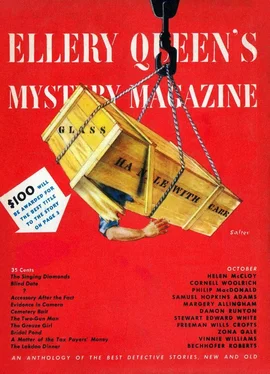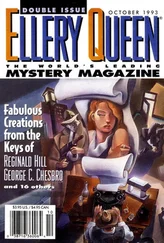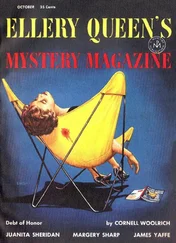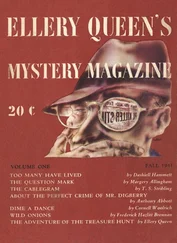Марджери Аллингем - Ellery Queen’s Mystery Magazine. Vol. 14, No. 71, October 1949
Здесь есть возможность читать онлайн «Марджери Аллингем - Ellery Queen’s Mystery Magazine. Vol. 14, No. 71, October 1949» весь текст электронной книги совершенно бесплатно (целиком полную версию без сокращений). В некоторых случаях можно слушать аудио, скачать через торрент в формате fb2 и присутствует краткое содержание. Город: New York, Год выпуска: 1949, Издательство: The American Mercury, Жанр: Классический детектив, на английском языке. Описание произведения, (предисловие) а так же отзывы посетителей доступны на портале библиотеки ЛибКат.
- Название:Ellery Queen’s Mystery Magazine. Vol. 14, No. 71, October 1949
- Автор:
- Издательство:The American Mercury
- Жанр:
- Год:1949
- Город:New York
- ISBN:нет данных
- Рейтинг книги:5 / 5. Голосов: 1
-
Избранное:Добавить в избранное
- Отзывы:
-
Ваша оценка:
- 100
- 1
- 2
- 3
- 4
- 5
Ellery Queen’s Mystery Magazine. Vol. 14, No. 71, October 1949: краткое содержание, описание и аннотация
Предлагаем к чтению аннотацию, описание, краткое содержание или предисловие (зависит от того, что написал сам автор книги «Ellery Queen’s Mystery Magazine. Vol. 14, No. 71, October 1949»). Если вы не нашли необходимую информацию о книге — напишите в комментариях, мы постараемся отыскать её.
Ellery Queen’s Mystery Magazine. Vol. 14, No. 71, October 1949 — читать онлайн бесплатно полную книгу (весь текст) целиком
Ниже представлен текст книги, разбитый по страницам. Система сохранения места последней прочитанной страницы, позволяет с удобством читать онлайн бесплатно книгу «Ellery Queen’s Mystery Magazine. Vol. 14, No. 71, October 1949», без необходимости каждый раз заново искать на чём Вы остановились. Поставьте закладку, и сможете в любой момент перейти на страницу, на которой закончили чтение.
Интервал:
Закладка:
But he still slept heavily. When she saw him again, again her suspicions fell from her. She knew he was asleep.
She shook him by the shoulder, noiselessly, but with increasing violence, until he opened his eyes with a groan. Then only she remembered that she was shaking his wounded arm. He saw the knife in her hand, and raised his left arm as if to ward off the blow.
“Listen,” she whispered, close to his ear. “Don’t speak. There is a man trying to break into the house. You must get up and help me.”
He stared at her, vaguely at first, but with growing intelligence. The food and sleep had restored him somewhat to himself. He sat up on the couch.
“Take off my boots,” he whispered; “I tried and could not.”
Her last suspicion of him vanished. She cut the laces with her knife, and dragged his boots off. They stuck to his feet, and bits of the woolen socks came off with them. They had evidently not been taken off for weeks. While she did it he whispered, “Why should anyone be wanting to break in? There’s nothing here to take.”
“Yes, there is,” she said. “There’s a lot of money.”
“Good Lord! Where?”
“Under the floor in the kitchen.”
“Are there many of ’em?”
“I don’t know.”
“Well, we shall know soon enough,” said the man. He had become alert, keen. “Have you any pistols?”
“Yes, one.”
“Fetch it, but don’t make a sound, mind.”
She stole away, and returned with the pistol. She would have put it into his hand, but he pushed it away.
“It’s no use to me,” he said, “with my arm in a sling. I will see what I can do with my left hand and the knife. Can you shoot?”
“Yes.”
“Can you hit anything?”
“Yes.”
“To be depended on?”
“Yes.”
“Well, it’s darned lucky. How long will that door hold?”
They were both in the little passage by now, pressed close together, listening to the furtive pick, pick of someone at the lock.
“I don’t think it will hold more than a minute.”
“Now, look here,” he said, “I shall go and stand at the foot of the stair, and knife the second man, if there is a second. The first man I’ll leave to you. There’s a bit of light outside from the snow. He’ll let in enough light to see him by as he opens the door. Don’t wait. Fire at him as he comes in, and don’t stop; go on firing at him till he drops. You’ve got six bullets. Don’t you make any mistake and shoot me. I’ve had enough of that already. Now you look carefully where I’m going to stand, and when I’m there you put out the lamp.”
He spoke to her as a man does to his comrade.
That she could be frightened did not seem to enter his calculations. He moved with catlike stealth to the foot of the tiny staircase and flattened himself against the wall. Then he stretched his left arm once or twice as if to make sure of it, licked the haft of the knife, and nodded at her.
She instantly put out the lamp.
All was dark save for a faint thread of light which outlined the door. Across the thread something moved once — twice. The sound of picking ceased. Then another sound succeeded it, a new one, unlike the last, as if something were being gently prised open, wrenched.
“The bar will hold,” she said to herself, and then remembered for the first time that the rung into which the bar slid had been loose these many days. It was giving now.
It had given!
The door opened silently, and a man came in.
For a moment she saw him clear, with the accomplice snow-light behind him. She did not hesitate. She shot once and again. He fell and struggled violently up, and she shot again. He fell and dragged himself to his knees, and she shot again. Then he sank gently and slowly down as if tired, with his face against the wall, and moved no more.
The man on the stairs rushed out and looked through the open door.
“By George, he was single-handed!” he said.
Then he stooped over the prostrate man and turned him over on his back.
“Dead!” he said, chuckling. “Well done, Missus! — stone dead!”
He was masked.
The dirty left hand tore the mask callously off the gray face.
The woman had drawn near and looked over his shoulder.
“Do you know him?” said the man.
For a moment she did not answer, and the pistol which had done its work so well dropped noisily out of her palsied hand.
“He is a stranger to me,” she said, looking fixedly at her husband’s fading face.
Margery Allingham remembers clearly the circumstances under which “Evidence in Camera” was born. There were {a) the place; (b) the people; (c) the props — and (d) the put-together-er... The original idea sprang into her head in a railway train (a). She was traveling to London in an overcrowded railway carriage — the English train, Miss Allingham reminds us, is a series of little compartments, like the the cartridge wallets on the shoulder belt of what Miss Allingham calls the “War of Independence” uniform. She found herself so wedged in among elbows, handbags, and the more intimate sections of her fellow travelers (b) that she could scarcely move her head. She was sitting on something — to this day she does not know what, although it was certainly alive, at least in the beginning of the trip. At any rate, all Miss Allingham could see was someone’s limp gray vest, which quivered not more than six inches from her nose. Across the vest hung a silver chain from which various small objects (c) depended — four medals, a disc which proclaimed the wearer to be a “Tail Wagger,” a tiny metal tassel — all oscillating hypnotically before Miss Allingham’s eyes as the train (a) rocked toward London.
On Miss Allingham’s knee rested a copy of the Medico-Legal Society’s quarterly report (c), containing an article on “Psychiatry and Degrees of Murder.” Miss Allingham was in need of a short-story plot and had intended to read the article during the railway journey, in the hope of picking up a psychological gimmick. But Medico-Legal journal remained unopened and unread. Instead, to occupy her thoughts, were (a) the sardine-packed scene, (b) the helter-skelter dramatis personæ, and (c) the swinging, swaying silver string.
And then came the catalyst (d). Just before the train arrived at its London terminus, which is dark and sooty and approached by many bridges, Miss Allingham, from her cramped and uncomfortable position, heard someone in the compartment say, softly but distinctly: “You ought to get that watch photographed.”
She saw neither the speaker nor the person addressed, but the words themselves were so odd, so cryptic, so elusively difficult to pin a meaning to — well, they took hold of her imagination and they held on with a bloodhound grip.
As a matter of fact, Miss Allingham simply had to write a story combining (a) the train, (b) the occupants of the railway carriage, and (c) the chain “charms” — simply to free herself from the haunting image of (d) a watch that had to be photographed. And as a matter of further fact, the essential plot worked itself out in her mind by the time a taxicab bounced her from the railway terminus to her London flat.
Thus was born Chippy Wager, the camera criminologist, the photographic private-eye — a hands-across-the-sea blood-brother to George Harmon Coxe’s Flashgun Casey, Crime Photographer.
Evidence in Camera
by Margery Allingham
Margery Allingham remembers clearly the circumstances under which “Evidence in Camera” was born. There were {a) the place; (b) the people; (c) the props — and (d) the put-together-er... The original idea sprang into her head in a railway train (a). She was traveling to London in an overcrowded railway carriage — the English train, Miss Allingham reminds us, is a series of little compartments, like the the cartridge wallets on the shoulder belt of what Miss Allingham calls the “War of Independence” uniform. She found herself so wedged in among elbows, handbags, and the more intimate sections of her fellow travelers (b) that she could scarcely move her head. She was sitting on something — to this day she does not know what, although it was certainly alive, at least in the beginning of the trip. At any rate, all Miss Allingham could see was someone’s limp gray vest, which quivered not more than six inches from her nose. Across the vest hung a silver chain from which various small objects (c) depended — four medals, a disc which proclaimed the wearer to be a “Tail Wagger,” a tiny metal tassel — all oscillating hypnotically before Miss Allingham’s eyes as the train (a) rocked toward London.
Читать дальшеИнтервал:
Закладка:
Похожие книги на «Ellery Queen’s Mystery Magazine. Vol. 14, No. 71, October 1949»
Представляем Вашему вниманию похожие книги на «Ellery Queen’s Mystery Magazine. Vol. 14, No. 71, October 1949» списком для выбора. Мы отобрали схожую по названию и смыслу литературу в надежде предоставить читателям больше вариантов отыскать новые, интересные, ещё непрочитанные произведения.
Обсуждение, отзывы о книге «Ellery Queen’s Mystery Magazine. Vol. 14, No. 71, October 1949» и просто собственные мнения читателей. Оставьте ваши комментарии, напишите, что Вы думаете о произведении, его смысле или главных героях. Укажите что конкретно понравилось, а что нет, и почему Вы так считаете.












